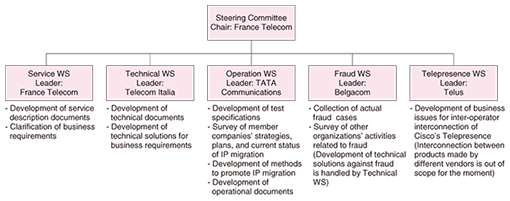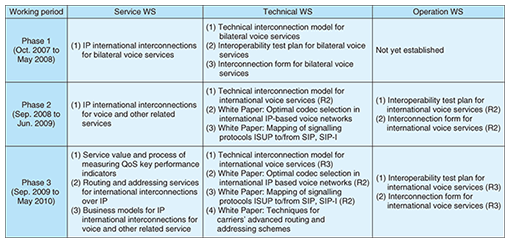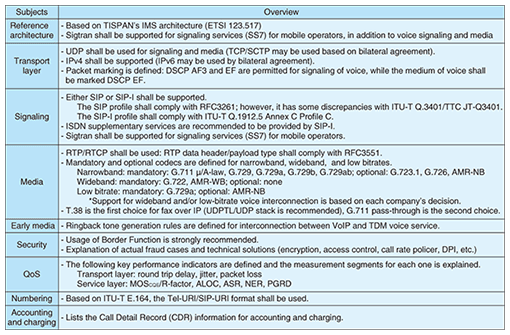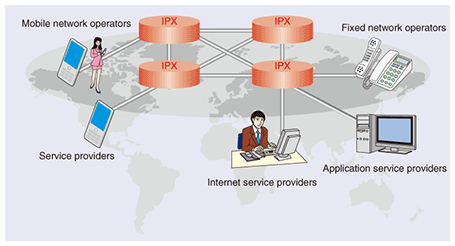 |
|||||||||||||||||||||
|
|
|||||||||||||||||||||
|
Global Standardization Activities Vol. 8, No. 10, pp. 8–13, Oct. 2010. https://doi.org/10.53829/ntr201010gls Activities of i3 Forum Related to Specifications for Implementing IP InterconnectionAbstractThis article introduces the i3 Forum°«s activities related to defining unique specifications for implementing Internet protocol (IP) interconnection between operators°« networks, especially for voice service.
1. IntroductionAround the globe, existing telecommunication networks are migrating to ones based on Internet protocol (IP), just like the commercial Next Generation Network (NGN) services that NTT launched in 2008. However, it is still common practice for voice over IP (VoIP) to be provided over the networks of multiple telecommunication operators through interconnection with the legacy public switched telephone network (PSTN). Technical standards for the network-to-network interface (NNI) for VoIP between operators°« networks have been defined by many standards developing organizations (SDOs) like ITU-T (International Telecommunication Union, Telecommunication Standardization Sector), ETSI TISPAN (European Telecommunication Standards Institute, Telecommunications and Internet converged Services and Protocols for Advanced Network), and 3GPP (3rd Generation Partnership Project). However, these technical standards have discrepancies and many optional items, which lead to multiple choices for actual implementations. The i3 Forum (International IP Interconnection Forum) [1] was established in 2007 by the international wholesale departments of eight major telecommunication operators (AT&T, Deutsche Telekom, France Telecom, SingTel, Telecom Italia, Telefonica, Telekomunikacja Polska, and TeliaSonera) to study technical specifications for implementing IP interconnection of international voice services over the networks of multiple telecommunication operators. By May 2008, the i3 Forum had developed documents on IP-based international voice services and disclosed them to the public; these documents include service descriptions, technical models for implementing IP interconnection, and test plans. The i3 Forum does not create its own new standard specifications, and its activities are mainly focused on selecting a unique technical specification for actual implementation among many already existing standards defined by SDOs, unifying optional items in those technical standards, and clarifying missing items in existing technical standards. The forum°«s scope is limited to international interconnection between operators°« networks; items unique to domestic networks of each county are not discussed. NTT joined the i3 Forum in September 2008 and has engaged in extending the previous outputs and studying new items. In July 2010, 37 operators worldwide were attending the forum°«s activities (14 from Europe, 10 from North America, 8 from Asia (NTT, KDDI, and Softbank Telecom are now participating from Japan), 2 from Oceania, and 3 from the Middle East & Africa). 2. Organization and activitiesThe i3 Forum does not hold corporate status and it is governed by flexible rules in the manner of a gentlemen°«s agreement. Membership is limited to telecommunication operators, and participation by vendor companies is rejected in principle. However, vendors may participate in the study of specific issues (for example, Cisco has been accepted in the study on interconnection for high-definition videoconferencing since 2010). The forum does not have a full-time secretariat and it is pragmatically managed by member companies°« own human resources. As the membership grows, it will be necessary to consider whether to keep the present flexible management intact or introduce more formal management. The organization of the i3 Forum is shown in Fig. 1. The forum is composed of a Steering Committee (SC) and Workstreams (WSs). SC is responsible for the action plan of the overall organization and WSs are responsible for studying actual subjects. Each WS studies subjects assigned by SC during a working period called a °»Phase°… (from September to May the following year) and all the deliverables are in principle publicized through the forum°«s website [1].
In Phase 1 (from October 2007 to May 2008), the Service WS and Technical WS were established and studies were carried out on the basic business requirements of IP interconnection of international voice services between operators and on detailed technical specifications. The Operation WS was set up in Phase 2 (from September 2008 to June 2009) to work on measures to promote IP migration. In Phase 3 (from September 2009 to May 2010), two new WSs were established: the Fraud WS for analyzing actual cases of fraud and sharing data among members and the Telepresence WS for studying inter-operator interconnection of high-definition videoconferencing. 3. DeliverablesAll the forum°«s deliverables in the last three years (Phases 1–3) up to May 2010 are listed in Table 1. In Phase 1, the following documents were created and made public: service descriptions of IP interconnection of international voice services, the technical model for inter-operator IP interconnection, and test plans based on the technical model. In Phase 2, the Phase 1 deliverables were revised and two technical white papers were created (one on the mapping between ISUP (ISDN user part) and SIP/SIP-I and the other on codec selection and transcoding (ISDN: integrated services digital network, SIP: session initiation protocol, SIP-I: SIP encapsulated ISUP)). These white papers were intended to present actual problems to SDOs in order to consolidate technical standards and to vendors to promote the development of products based on them. In Phase 3, studies were focused on methods of measuring quality-of-service (QoS) parameters and practical procedures of using measured QoS parameters to manage actual services from the service, technical, and operational standpoints. Moreover, basic studies were done on the routing and addressing issues for voice services fully migrated to IP and on number portability solutions.
The main result of the i3 Forum is the technical model (Release 3) [2], which specifies the subjects listed in Table 2. These specifications are regarded as guidelines and they are defined as being nonbinding on the actual implementations of i3 Forum member companies. Since this technical model is defined for interconnection between international wholesale networks, it includes items that are inconsistent with the Japanese domestic networks such as support for Sigtran for IP migration of signaling services (SS7) for mobile communications and support for multiple codecs used in both fixed and mobile operators of domestic networks in each country to avoid end-to-end transcoding as much as possible. Moreover, SIP and SIP-I are recommended to be used for signaling protocols but the SIP profile (methods, headers, etc.) is not identical to the one defined in ITU-T Recommendation Q.3401 and TTC JT-Q3401, which is the basis of the specification of NTT°«s NGN.
As for quality control, which is focused on in Phase 3, QoS parameters for the IP transport layer and service layer are listed. For each parameter, a definition and measuring method are specified. The technical model (Release 3) also includes items related to actual service operation (e.g., where to generate a ringback tone when IP-based and conventional voice services in a PSTN are interconnected). 4. Other activitiesIn addition to studying business, technical, and operational issues of inter-operator IP interconnection, the i3 Forum is continuously surveying the strategy, future plans, and current IP migration status of member companies. The forum is aggressively working to communicate its activities to the outside world. A Phase is primarily set to coincide with the major industry event of international wholesale network operators and the forum actively engages in this event every year through the keynote speech of the i3 Forum Chairman, panel discussion by SC members, and other activities. The first i3 Forum Technical Workshop was held in June 2010 with invitations sent to SDOs and vendor companies. This workshop was intended to present technical problems that became obvious during the forum°«s last three years°« work and encourage SDOs and vendors to develop solutions for them. 5. Cooperation with other forumsGSMA (GSM Association; GSM: global system for mobile communications) [3] is the largest industry body of mobile telecommunication operators and its membership includes more than 750 mobile operators in more than 200 countries and more than 200 vendor companies. In 2004, GSMA invented IPX (IP eXchange) (Fig. 2), which is a new model of international interconnection based on IP. The business and technical specifications of IPX have been developed by GSMA together with pre-commercial implementation trials for verifying this model [4], [5].
IPX is defined as °»an interconnect service that is offered by a variety of carriers on a competitive basis but with common agreed technical specifications and using consistent commercial models. The managed network environment is traffic engineered to support specific IP services at specific quality levels°… [6]. It is supposed to be a secure, quality-controlled, private IP network comprising a limited number of interconnected hubs. Current international voice services are provided over a huge number of wholesale carriers, and each interconnection is bilaterally contracted and implemented between a domestic telecommunication operator and an international wholesale carrier or between two international wholesale carriers. This makes it difficult to achieve an end-to-end service quality guarantee and to clarify the party responsible for any trouble that occurs. IPX is designed to guarantee end-to-end service quality and security and to clarify the responsible party by specifying a simple network composed of a limited number of hubs. It also aims to unify and simplify the contract and its implementation between domestic telecommunication operators and international wholesale carriers (IPX providers). IPX is based on the current GRX (GPRS Roaming Exchange; GPRS: general packet radio service), which mediates the roaming of mobile operators°« data services. It is designed to support a wide range of IP-based services including voice and to provide its services not only to mobile operators but also to fixed operators, Internet service providers, and application service providers. GSMA°«s IPX model is pressing international wholesale carriers to change their present business model; therefore, the i3 Forum is now asking GSMA to revise the business and technical requirements of IPX, which are practically unachievable. Moreover, GSMA°«s technical specifications are insufficient for actual IPX implementation and there are concerns that interworking between IPX providers will not be assured once each IPX provider launches IPX services based on its unique technical specification. The i3 Forum is going to propose to GSMA a refinement of the existing technical specifications for IPX. A joint effort between the i3 Forum and GSMA started at the beginning of 2010, in order to revise IPX°«s existing business and technical requirements into ones more suitable for both organizations, and the IPX technical specifications will be refined afterwards. The i3 Forum and GSMA are studying routing and addressing issues and number portability solutions, respectively. These two organizations agreed to jointly study both the business and technical aspects of utilizing ENUM (E.164 number mapping)* later. The i3 Forum actively cooperates with other forums to overcome the technical problems that have become obvious during the last three years of work. One example is a joint program with the SIP Forum [7] on revision of ITU-T Recommendation T.38, which defines the procedures for realtime Group 3 facsimile communication over an IP network and on the verification of proposed revisions generated through interworking trials. As for quality control methods, the i3 Forum cooperates with MSF (Multi-Service Forum) [8], which has been engaging in interoperability test trials of NGN-related technologies, to plan quality monitoring trials at the NNI. 6. Future activitiesTechnical model (Release 3) and other deliverables of the i3 Forum will be appropriately revised in the future. Phase 4 (starting from September 2010) will focus on a detailed study of the business and technical aspects of the routing and addressing issues and number portability solutions and revision of the signaling protocol profiles (especially mapping between ISUP and SIP/SIP-I).
References
|
|||||||||||||||||||||












